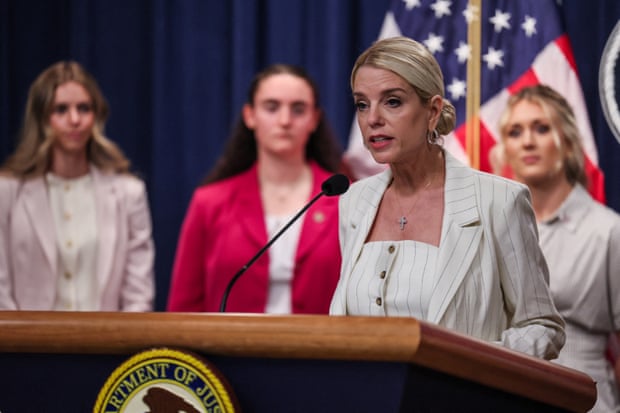Trump sues Maine over transgender athletes in schools amid funding threats
Trump sues Maine over transgender athletes in schools amid funding threats
The federal lawsuit comes after the Trump administration tried to cut off all of Maine's federal funding for public schools and school lunches.
The Trump administration sued Maine on Wednesday for allowing transgender girls to compete in school sports, dramatically escalating a confrontation that has already seen threats to cut the state’s education and school lunch funding.
The attorney general, Pam Bondi, announced the lawsuit flanked by Riley Gaines, the former collegiate swimmer turned conservative commentator who has become the public face in opposition to transgender athletes.
“The Department of Justice will not sit by when women are discriminated against in sports,” Bondi said in a Wednesday morning press conference. “This is also about these young women’s personal safety.”
Bondi outlined plans to stop Maine’s policy through a court order, strip titles from transgender athletes to give them to cisgender female competitors, and potentially claw back federal funding the state had received.
When a reporter asked if Bondi’s office was preparing to target other states, the attorney general said that California and Minnesota “are the top two that should be on notice”.
Despite the administration’s aggressive stance, the NCAA president, Charlie Baker, said in January that fewer than 10 of the 510,000 collegiate athletes nationwide publicly identify as transgender.
The legal action follows a tense White House encounter months earlier when Maine’s Democratic governor, Janet Mills, directly challenged Donald Trump over the issue after attempting to make an example out of her in front of other governors.
Mills said: “We’ll see you in court.”
Trump administration officials claim Maine violates Title IX by not barring transgender girls from female sports teams. Maine has flatly rejected this interpretation, refusing to sign a settlement that would implement those restrictions.
“We are at an impasse,” Maine’s assistant attorney general, Sarah Forster, wrote in an 11 April letter. “Nothing in Title IX prohibits schools from allowing transgender girls and women to participate on girls’ and women’s sports teams.”
The administration has already attempted to withhold the federal governments entire $250m contribution to Maine’s K-12 education budget and freeze school lunch funding – a move temporarily blocked by a federal judge after Maine filed its own lawsuit.
The dispute comes as part of a wider federal crackdown. In February, Trump signed an executive order barring transgender participants from women’s sports. The Guardian learned soon after that the state department has instructed officials to deny visas to transgender athletes attempting to enter the US for competitions – with instructions to impose permanent visa bans on those deemed to misrepresent their birth sex.
A bill to rewrite Title IX to define sex as matching genetics from birth that would have sweeping effects on transgender athletes in sports had passed the House in a nearly party-line vote in January, but would need Democratic support to advance through the Senate.
There is a lot at stake
The world’s most powerful man is using his office to punish journalistic organisations that won’t follow his orders or who report critically on his policies. Donald Trump’s actions against the press include bans, lawsuits and hand-picking his own pool of reporters.
But the global threat against the press is bigger than just Trump.
Economic and authoritarian forces around the globe are challenging journalists’ ability to report. An independent press, one that those in power can’t simply overrule, is crucial to democracy. Figures such as Trump and Hungary’s Viktor Orbán want to crush it through exclusion and influence.
The Guardian is a global news organisation that will stand up to attacks on the free press. We have no interest serving those with immense power or immense wealth.
We are owned by an independent trust devoted only to protecting and defending our journalism. That means we don’t have a billionaire owner dictating what our reporters can cover or what opinions our columnists can have, or shareholders demanding a quick return.
The global situation is shifting hour by hour, making this an extremely challenging moment. It will take brave, well-funded, committed, quality journalism to call out what is happening.
Our job is to make sure we do not get overwhelmed as Trump floods the zone. We must focus on the stories that will make the biggest impact on people’s lives, while holding the powerful to account. We’ll also continue to focus on the ideas people need to create a better world: a reason for hope.
As the writer and Guardian columnist Rebecca Solnit says: “authentic hope requires clarity … and imagination”.
The Guardian can provide both and, with the help of readers like you in Bangladesh, we can drive hope by reporting truthfully on what is happening and never pulling our punches.
A lot is at stake.
If you believe in the importance of open journalism, make the most of an annual All-access digital subscription – with 30% off.
Katharine Viner
Editor-in-chief, the Guardian
Picture of Kath Viner
Continue
Remind me in May
Accepted payment methods: Visa, Mastercard, American Express and PayPal
